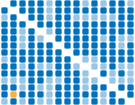The page of Laučík, Ivan, English Reception
Reception
CHARACTERISTICS OF HIS WRITINGHe entered the literary scene as a member of the poetical group Solitary Runners with a book of poems Moveable within the Moveable in which he expressed his concern over the state of human civilisation threatened by doom. His second collection We Are Relatives in the Beginning reflects the chaotic modern world but at the same time points out each individual’s possibilities for protecting basic human values. After almost twenty years of forced silence he published another collection of poems, On the Threshold of Audibility in which he depicted the present full of contradictions and conflicts caused by exploitation of nature. The collection On a Flight Path expressed the poet’s yearning for human understanding and mutual love. There is an almost nostalgic return to memories.
As one of his closest colleagues, Ivan Štrpka writes: “The threshold of Laučík’s poem starts somewhere at the point where boundaries between experience and reflection are pulled down beginning to intertwine instead. (...) The space of his poem is synthesising, holistic. Its time is now. Its mode - to be present and therefore alive. Every poem is a dynamic meaningful process of creation aiming at an entirely new whole, not just a sum of meanings. (...) His concise expression, bluntness, writing methods close to juxtaposition, dynamic semantic editing, suggestive visuality, gentle irony and sarcasm are most eloquent. There is no redundancy.”
ON THE AUTHOR
Laučík, unlike the rest of the Solitary Runners group, uses entropy as a constitutional element of literary text. He is not trying to diminish vagueness in his poetry, to make the text clear by filling in gaps and he certainly isn't willing to tell the whole story. He leaves this to the reader, letting him create a space in which loosely hanging meanings of individual words suddenly become coherent. Laučík uses series form, i. e. connecting elements which gain their meaning from context and by repetition, almost to the point of being unbearable. Communicating with the text is quite demanding and with each reading the book will seem different, the structure of Laučík’s - and the reader’s - world is changing constantly. Maybe it is the Borgesian book of sand, where every opening results in different reading. (Martin Kasarda)
Light in Laučík’s poetry has its own volume, weight, depth and width, its own physicality. It is more like a sharp ray that can cut and penetrate than impressionist twinkling. (...) That is why there are so many norths, marches, sharpness and precision: not to evoke frost and make everyone cold but to make everything clean, visible and accurate. (Daniel Hevier)
Laučík s lyrical subject is stigmatised by a feeling of threat experienced as something permanent. (...) Man - as seen by Laučík - is a fragile, vulnerable being threatened mainly by his own destructive activity, a fatal curse from which he cannot free himself. It is an absurd situation, bizarre in its essence and that is why the poet uses bizarre language, style and imagery. (Igor Hochel)
Laučík’s “solitary-runner” principle is certainly different from routine understanding of poetry. (...) One part of his simile always stands outside the poem - which becomes an open structure. It may seem that this structural incongruity causes the uncommunicativeness of his poetry. Only seemingly, dear conventionalists. Because the poem opens tip to human sensibility, which has not been formulated yet, seeking and provoking the missing part. (...) In fact, these poems are something like a film script recording human consciousness, evoking inherent sensitivity and only here, in this space, the shape is completed and filled with action of the poem which has thus reached its goal: to act within the space defined by action. (Ivan Štrpka)




